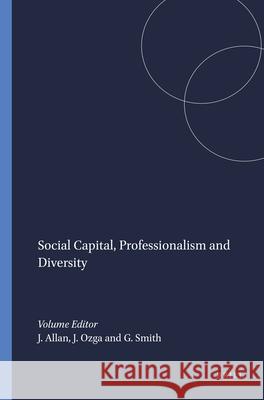Social Capital, Professionalism and Diversity » książka
Social Capital, Professionalism and Diversity
ISBN-13: 9789087908171 / Angielski / Miękka / 2009 / 240 str.
Social Capital, Professionalism and Diversity is a response to the challenges faced by teachers and other public sector professionals in attempting to manage an increasingly diverse population, whilst simultaneously being subjected to public scrutiny through measures of performance. Social capital has increasingly been seen by policy makers and academics as a possible resource for education, allowing children and young people, and the professionals who work with them, to do better as a result of having strong networks, relationships and trust. There has, however, been little attention to how social capital might actually be used by professionals within educational contexts or to the benefits of enhanced social capital for children and young people, their families, and the professionals themselves. The contributors to this volume provide commentaries on what is known about social capital and its use in educational contexts; the engagement of teachers and other professionals with diversity; and social capital and diversity among children, young people and families. Social Capital, Professionalism and Diversity will appeal to teacher educators and policymakers with concerns about the challenges faced by teachers and other public sector professionals and with an interest in how social capital might enable an effective response to diversity in educational contexts. The book will be of particular interest and use to student and beginning teachers in responding to diversity as they develop their own professional identities and to practising teachers with an interest in pursuing new forms of professional renewal.
Social Capital, Professionalism and Diversity is a response to the challenges faced by teachers and other public sector professionals in attempting to manage an increasingly diverse population, whilst simultaneously being subjected to public scrutiny through measures of performance. Social capital has increasingly been seen by policy makers and academics as a possible resource for education, allowing children and young people, and the professionals who work with them, to do better as a result of having strong networks, relationships and trust. There has, however, been little attention to how social capital might actually be used by professionals within educational contexts or to the benefits of enhanced social capital for children and young people, their families, and the professionals themselves. The contributors to this volume provide commentaries on what is known about social capital and its use in educational contexts; the engagement of teachers and other professionals with diversity; and social capital and diversity among children, young people and families.Social Capital, Professionalism and Diversity will appeal to teacher educators and policymakers with concerns about the challenges faced by teachers and other public sector professionals and with an interest in how social capital might enable an effective response to diversity in educational contexts. The book will be of particular interest and use to student and beginning teachers in responding to diversity as they develop their own professional identities and to practising teachers with an interest in pursuing new forms of professional renewal.











